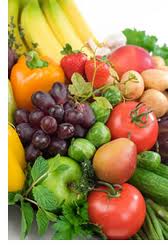 Fruits and vegetables are an important part of a healthy diet. Your local markets carry an amazing variety of fresh fruits and vegetables that are both nutritious and delicious. Previous blogs on this site have discussed ways to reduce your risks due to agricultural toxins in pesticides. As you enjoy fresh produce, it is also important to handle these products safely in order to reduce the risks of foodborne illness.
Fruits and vegetables are an important part of a healthy diet. Your local markets carry an amazing variety of fresh fruits and vegetables that are both nutritious and delicious. Previous blogs on this site have discussed ways to reduce your risks due to agricultural toxins in pesticides. As you enjoy fresh produce, it is also important to handle these products safely in order to reduce the risks of foodborne illness.
Federal health officials estimate that nearly 48 million people are sickened by food contaminated with harmful germs each year, and some of the causes might surprise you. Although most people know animal products must be handled carefully in the kitchen to prevent illness, many don’t realize that produce can also be the culprit in outbreaks of foodborne illness. In recent years, the United States has had several large outbreaks of illness caused by contaminated fruits and vegetables—including spinach, tomatoes, and lettuce.
Glenda Lewis, an expert on foodborne illness with the Food and Drug Administration, says fresh produce can become contaminated in many ways. During the growing phase, fruits and veggies may be contaminated by animals, harmful substances in the soil or water, and poor hygiene among workers. After produce is harvested, it passes through many hands, increasing the contamination risk. Contamination can even occur after the produce has been purchased, during food preparation, or through inadequate storage.
FDA says to choose produce that isn’t bruised or damaged, and make sure that pre-cut items—such as bags of lettuce or watermelon slices—are either refrigerated or on ice both in the store and at home. In addition, follow these recommendations:
- Wash your hands for 20 seconds with warm water and soap before and after preparing fresh produce.
- Cut away any damaged or bruised areas before preparing or eating.
- Gently rub produce while holding under plain running water. There’s no need to use soap or a produce wash.
- Wash produce BEFORE you peel it, so dirt and bacteria aren’t transferred from the knife onto the fruit or vegetable.
- Use a clean vegetable brush to scrub firm produce, such as melons and cucumbers.
- Dry produce with a clean cloth or paper towel to further reduce bacteria that may be present.
- Throw away the outermost leaves of a head of lettuce or cabbage.
- Store perishable produce in the refrigerator at 40 degrees or below.
Source: Food and Drug Administration

 The more I learn about contaminants in the environment, the more I shop at the local organic market---but it can be expensive. At a recent lecture held at Northwestern on the Environment and Women's Reproductive Health, I learned that some fruits and vegetables are likely more contaminated than others. So the key to healthier eating on a budget is to go organic with the 'dirty' foods and still buy conventionally farmed produce that is least likely to be affected by contamination.
The more I learn about contaminants in the environment, the more I shop at the local organic market---but it can be expensive. At a recent lecture held at Northwestern on the Environment and Women's Reproductive Health, I learned that some fruits and vegetables are likely more contaminated than others. So the key to healthier eating on a budget is to go organic with the 'dirty' foods and still buy conventionally farmed produce that is least likely to be affected by contamination.